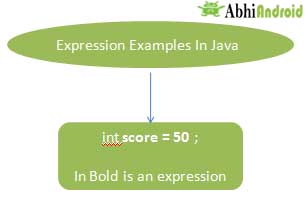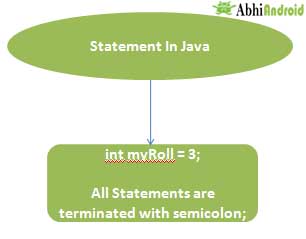Expression, Statement And Code Blocks In JAVA
In this article we will talk about expressions, statements and code blocks in JAVA.
Table of Contents
What Is Expressions in JAVA & Definition:
Expressions are building blocks off all JAVA programs which are made up of variables, operators, and method invocations. The expression are created according to the syntax and evaluates to a single value. For example, if we want to covert miles to kilometre we first need to know a mile is equal to 1.609344km. Now lets suppose we want to convert 50 miles to kilometres.
double kilometres = (50 * 1.609344);
In the above statement kilometres = (50 * 1.609344) is an expression and data type double is not part of an expression. Typically except data type and ; forms an expression.
Expression Examples In JAVA:

int score = 50; //In bold is an expression
If you are using literal value, then except data type and ; is a part of expression. So score = 50 is an expression.
Another example of expression:
if(score == 50){
System.out.println( “This is also an expression” );
}
If you are using control flow if statements, then component inside bracket is a part of expression. So score == 50 is an expression. Remember here braces ( and ) is not part of expression.
Also for methods component inside bracket is a part of expression. So “This is also an expression” is an expression. Remember here also braces ( and ) is not part of expression.
Statement In JAVA:
Statement forms a complete unit of execution. All statements are terminated with semicolon (;). For example:

int myRoll = 3;
The above complete line is a statement. In JAVA following types form expressions of assignment: any use of ++ or – – , method invocations and object creation expressions can be made into statement by terminating with semicolon(;);
Lets see each type expression made into statement:
Assignment expression made into expression:
int myRoll = 3;
Any use of ++ or — made into expression:
myRoll++; myRoll--;
Method invocations:
System.out.println(myRoll); Object creation expressions made into statements Bike myBike = new Bike();
Important Note: Declaration statements and control flow statements are other two types of statements in JAVA.
Blocks:
A blocks in JAVA is a group of zero or more statements enclosed between braces. The block begins with opening braces ({) and ends with closing braces (}). Even though it is a statement but doesn’t end with semicolon(;). For example:
{
int myRoll = 3;
String myName = “Abhishek”;
}
It is mostly used with control flow statement. For example:
If (x == 50){
System.out.println(“Example of control flow statement”);
x--;
}
In the above example all code inside braces {} is part of blocks.
Recent Posts
- Boolean Class in JAVA with Example
- Difference Between String And StringBuffer in JAVA With Example
- String Tokenizer in JAVA with example
- Life Cycle of a Thread In JAVA
- Creating a Thread in Java with Example
Premium Project Source Code:
- Food Ordering Android App Project Source Code
- Ecommerce Store Android App Project Source Code
- Convert Website Into Android App Project Source Code
- Quiz Game Android App Project Source Code
- Radio Streaming Android App Source Code
- City Guide Android App Project Source Code
- QR Barcode Android App Project Source Code
Leave a Reply